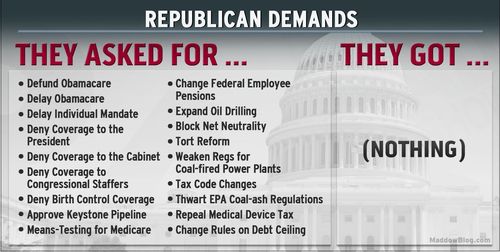… and he's right in a sense. The Democrats didn't have to concede anything and they didn't gain anything; the Republicans didn't have to concede anything and they didn't gain anything.
On the other hand, the Democrats weren't trying to gain anything, and the House Republicans were (they wanted to defund Obamacare), sosomebody did lose in all this.
And then there's public opinion:
The Tea Party's standing with Americans is at its lowest point since the movement took shape in 2010, according to a Pew Research Center poll released Wednesday.
The survey, conducted from Oct. 9-13, reports that nearly half (49 percent) of the public now view the Tea Party unfavorably, compared with 30 percent who view it favorably. Since February 2010, when Pew first began gauging opinion on the Tea Party, unfavorable views have nearly doubled, and the number of "very unfavorable" views has tripled.
In June, when Pew last polled on the Tea Party and before the latest Washington budget battle fully ratcheted up, 45 percent said they held an unfavorable view of the Tea Party, while 37 percent reported they had a favorable view.
Michael Dimock, the director of the Pew Research Center for the People and the Press, told All Things Considered host Audie Cornish that one of the issues is that people don't really know what the Tea Party is about.
"There's not really a consensus about what the Tea Party is, whether it's kind of an outside group trying to steer policy or whether it's working within the Republican Party itself," Dimock says.
The poll, which was in the field as congressional Republicans continued their push to remove financing for President Obama's health care law as part of a deal to reopen the government, found that the Tea Party's popularity is falling even among Republicans.
Pew reported that 53 percent of Republicans now view the Tea Party favorably, down from 62 percent in June; and 27 percent view it unfavorably, up from 23 percent in June.
To show you just how crazy the far right has gotten, they've even lost Ross Douthat. Even him!
But with tonight’s vote done and the government open once again, I want to return to the theme of my Sunday column, and stress once more the essential absurdity of the specific populist gambit we’ve just witnessed unfold, drag on, and now finally collapse. However you slice and dice the history, the strategery, and the underlying issues, the decision to live with a government shutdown for an extended period of time — inflicting modest-but-real harm on the economy, needlessly disrupting the lives and paychecks of many thousands of hardworking people, and further tarnishing the Republican Party’s already not-exactly-shiny image — in pursuit of obviously, obviously unattainable goals was not a normal political blunder by a normally-functioning political party. It was an irresponsible, dysfunctional and deeply pointless act, carried out by a party that on the evidence of the last few weeks shouldn’t be trusted with the management of a banana stand, let alone the House of Representatives.
This means that the still-ongoing intra-conservative debate over the shutdown’s wisdom is not, I’m sorry, the kind of case where reasonable people can differ on the merits and have good-faith arguments and ultimately agree to disagree. There was no argument for the shutdown itself that a person unblindered by political fantasies should be obliged to respect, no plausible alternative world in which it could have led to any outcome besides self-inflicted political damage followed by legislative defeat, and no epitaph that should be written for its instigators’ planning and execution except: “These guys deserved to lose.”
And it’s important for conservatives and Republicans to recognize this, and remember it, because what just happened can happen again, and next time the consequences may be more severe. The mentality that drove the shutdown — a toxic combination of tactical irrationality and the elevation of that irrationality into a True Conservative (TM) litmus test — may have less influence in next year’s Beltway negotiations than it did this time around, thanks to the way this has ended for the defunders after John Boehner gave them pretty much all the rope that they’d been asking for. But just turn on talk radio or browse RedState or look at Ted Cruz’s approval ratings with Tea Partiers and you’ll see how potent this mentality remains, how quickly it could resurface, and how easily Republican politics and American governance alike could be warped by it in the future.


